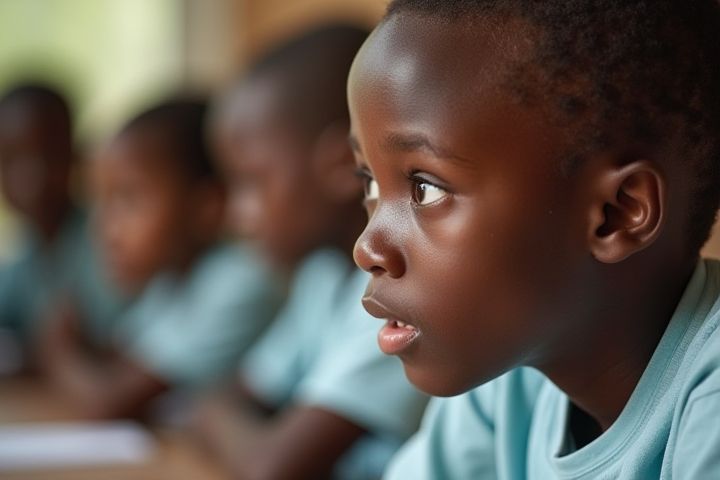
Education inequality in Nigeria is a pressing issue, significantly affecting children's access to quality learning experiences. Factors such as socioeconomic status, geographical location, and cultural beliefs create disparities that hinder educational equity. In rural areas, for instance, limited access to schools, inadequate facilities, and a lack of qualified teachers exacerbate the situation. Gender disparities are particularly pronounced, with girls often facing societal barriers that prevent them from pursuing education. Addressing these inequalities is essential for promoting social development and economic growth in Nigeria, ensuring that every child has the opportunity to succeed academically.
Socioeconomic Disparities
Education inequality in Nigeria is deeply rooted in socioeconomic disparities, significantly affecting access to quality learning resources and opportunities. Families in lower-income brackets often struggle to afford educational materials, transportation, and fees, leading to higher dropout rates among children. Rural areas, where schools are scarce and often poorly funded, face even greater challenges compared to urban regions with more institutional support. Addressing these inequalities requires targeted policies that invest in infrastructure and provide financial assistance to underprivileged families, empowering all children to achieve their full potential in education.
Gender Inequality
In Nigeria, education inequality is significantly exacerbated by gender disparity, leading to a notable gap in literacy rates between male and female students. Cultural norms and economic barriers often restrict girls' access to education, resulting in a higher dropout rate among females, especially in rural areas. Programs aimed at promoting girls' education, such as scholarship initiatives and community awareness campaigns, are crucial in addressing this imbalance and empowering young women. By investing in girl-centric educational reforms, Nigeria can enhance overall national development and unlock the potential of its female population.
Urban-Rural Divide
Education inequality in Nigeria is prominently marked by the urban-rural divide, where urban areas often have better access to quality educational resources and infrastructure compared to rural regions. In urban centers, schools are typically equipped with experienced teachers, modern facilities, and technological tools, enhancing learning opportunities for students. Conversely, rural schools frequently face challenges such as a lack of trained educators, inadequate facilities, and limited access to educational materials, leading to higher dropout rates and lower academic performance. This disparity not only impacts individual students but also hinders the overall socio-economic development of rural communities, perpetuating cycles of poverty and limiting future opportunities.
Quality of Infrastructure
Education inequality in Nigeria is significantly influenced by the quality of infrastructure, which varies greatly between urban and rural areas. Many schools in rural regions lack essential facilities such as libraries, laboratories, and even adequate classrooms, hindering effective learning. In contrast, urban schools often boast better resources, trained teachers, and access to technology, creating a disparity in educational outcomes. Addressing this infrastructural gap is crucial for ensuring equitable education opportunities for all Nigerian students.
Teacher Shortage
Teacher shortage in Nigeria significantly exacerbates education inequality, leaving millions of children without access to quality education. With a teacher-to-student ratio often exceeding acceptable standards, many classrooms are overcrowded, hindering personalized attention and engagement. Rural areas and northern regions are disproportionately affected, where untrained or underqualified teachers are the norm. Addressing this crisis requires targeted investments in teacher recruitment, training, and incentives to attract skilled educators to underserved communities.
Curriculum Gap
In Nigeria, curriculum gap underscores the severe education inequality, with significant disparities between urban and rural education systems. Schools in urban areas often provide access to modern teaching resources, updated curricula, and extracurricular activities, while rural institutions frequently rely on outdated materials and a lack of qualified teachers. This discrepancy hinders students' academic growth and limits their opportunities for higher education and job placements. Addressing the curriculum gap is essential for fostering equitable education and empowering Nigerian youth to achieve their full potential.
Wealth Disparity
Education inequality in Nigeria is significantly influenced by wealth disparity, creating a divide in access to quality educational resources. Affluent families often afford private schooling, which typically offers superior facilities, experienced educators, and comprehensive extracurricular activities, enhancing student learning outcomes. In contrast, students from low-income households frequently attend underfunded public schools, facing overcrowded classrooms and inadequate teaching materials. This wealth-based imbalance perpetuates a cycle of poverty, limiting opportunities for social mobility and economic empowerment for the less fortunate.
Political Influence
Education inequality in Nigeria is significantly exacerbated by political influence, where decisions regarding funding and resources often reflect the priorities of those in power rather than the needs of the population. Wealthy political elites frequently manipulate educational policies to favor their own constituencies, resulting in a disparity in access to quality education between urban and rural areas. Corruption within the educational sector further undermines efforts for equitable education, diverting funds meant for schools and teachers' training. As a result, the cycle of poverty and low educational attainment continues, hindering Nigeria's long-term socio-economic development.
Language Barriers
Language barriers significantly contribute to education inequality in Nigeria, where over 500 languages are spoken across diverse ethnic groups. Many students are taught in a language that is not their mother tongue, leading to difficulties in comprehension and learning outcomes. This linguistic divide hinders access to quality education, particularly in rural areas, where resources are limited and teachers may lack proficiency in local languages. Addressing these language challenges is crucial for improving educational equity and fostering inclusive learning environments for all Nigerian children.
Access to Technology
Education inequality in Nigeria is significantly influenced by disparities in access to technology, impacting students' ability to engage with modern learning resources. Urban areas often enjoy better technological infrastructure, such as reliable internet connectivity and availability of devices, while rural regions struggle with limited access, hindering educational opportunities. This digital divide exacerbates the existing gaps in academic performance and opportunities, as students in underserved areas are unable to utilize online learning platforms or digital educational tools. Addressing this issue is essential for fostering equitable education, promoting digital literacy, and enabling all students to thrive in an increasingly technology-driven world.
